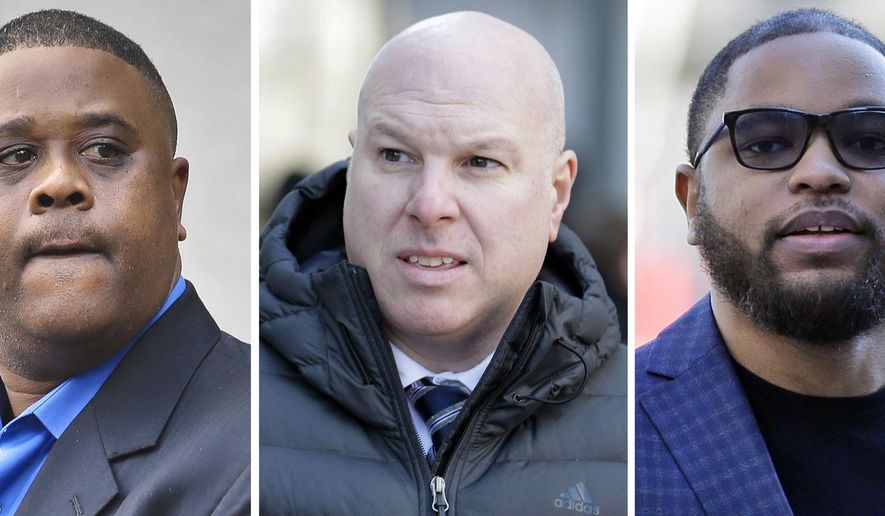Prosecutors taking wrong approach in NCAA basketball probe

By DERON SNYDER (as published in The Washington Times)
The District’s yet-to-be named XFL franchise should call itself the Washington Feds. If it takes after prosecutors in United States Attorneys’ offices (better than 90 percent conviction/plea bargain rate), the team would rarely lose.
I’m no legal expert. But if you can win a case that paints universities as fraud victims, when a sneaker company pays recruits to play at said universities, you obviously wear Teflon suits in the courtroom.
We still have a long way to go in what’s essentially United States v. College Basketball as We Know It. Tuesday’s development – in which two former Adidas executives and an aspiring NBA agent received jail time – was nothing compared to what might lie ahead in upcoming trials.
“It’s going to be a street fight,” defense attorney Steve Haney told Yahoo Sports. “I have very strong feelings about the case.”
The feeling was mutual on the other side of the aisle, where Assistant U.S. Attorney Ted Diskant argued that Jim Gatto, Merl Code, and Christian Dawkins deserved lengthy sentences for their October convictions. Kudos to Judge Lewis A. Kaplan for not being as gullible as the jury. He gave Gatto nine months instead of the recommended 46 to 57 months; Code and Dawkins, facing a recommended 30 to 37 months, got six months apiece.
But Khuzhami couldn’t just take the ‘L’ and leave it at that. He tried to spin the minimum-security wrist slaps as big wins, when clearly Kaplan wasn’t impressed with universities’ victimhood.
“The sentences imposed today,” Khuzhami said in a statement, “only begin to reflect the magnitude of the harm these defendants caused through a scheme that not only defrauded multiple public universities but upended the lives of young student-athletes and corrupted a game cherished by so many.”
On the contrary, the NCAA’s corrupt amateurism scheme is what defrauds and harms young student athletes. The policy is the real crime, and everyone gets a piece of the action – administrators, coaches, and broadcast networks – except the labor.
This multiyear probe into college basketball was supposed to turn the sport upside down, a thought that shook insiders. Next up is a bribery case involving Code and Dawkins, as well as a case in which former Auburn assistant Chuck Person faces bribery charges. But instead of “cleaning up” the game, the investigation might make the NCAA come clean and address it unjust business model.
Haney, who represents Dawkins, seeks to put multiple head coaches on the witness stand, “as many as I can get in the courtroom,” he said. “We are going to pull back the curtains [on the sport].”
Only former Louisville coach Rick Pitino has lost his job so far, but Arizona’s Sean Miller and LSU’s Will Wade have some explaining to do after being caught on federal wiretaps talking to Dawkins about recruiting. They might not be the only coaches worried about discussing such matters in open court.
Kaplan said he handed down the sentences to send a “great big warning light to the basketball world” and to “deter others and make them think twice before engaging in this type of conduct.” Here’s the problem, though: Such conduct is part and parcel of the sport.
The sneaker companies pay the schools and the schools pay the coaches. Advertisers pay the networks and the networks pay the NCAA. The loose change in the couch cushions goes to AAU programs and the players.
The latter group gets hosed, but the arrangement was neither a secret nor a big deal … until the Justice Department made it a federal case by putting NCAA rules on the same level as, you know, actual statutes.
NCAA policies aren’t the law, but they’re probably breaking the law. If there’s any justice in this land, an ongoing case like NCAA Athletic Grant-in-Aid Cap Antitrust Litigation v. NCAA eventually will be the real game-changer in college sports, not sneaker execs and coaches on trial for giving families a sliver of the pie.
College go to great lengths in competing for the top athletes, including massive investments in coaching staffs, stadiums, arenas, and training facilities. Everything is subject to market conditions except a player’s value to a school, which is fixed.
Again, I don’t have a law degree. But that sounds like anticompetitive business practices to me.
The feds would be better served pursuing that angle if they really want to make a difference.
Because their present approach is a joke.
— Brooklyn-born and Howard-educated, Deron Snyder writes his award-winning column for The Washington Times on Tuesdays and Thursdays. Follow him on Twitter @DeronSnyder.
 Follow
Follow
